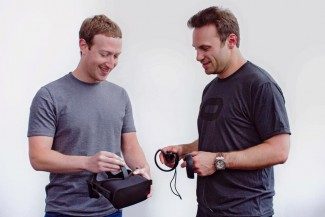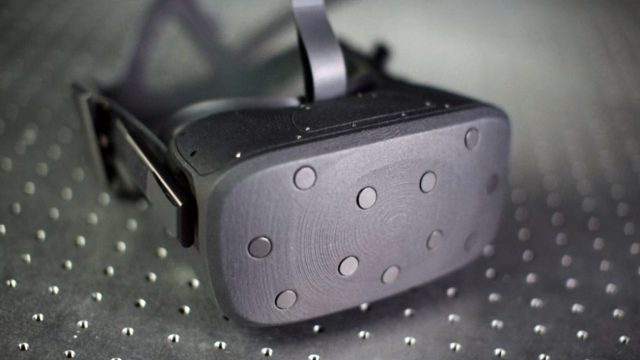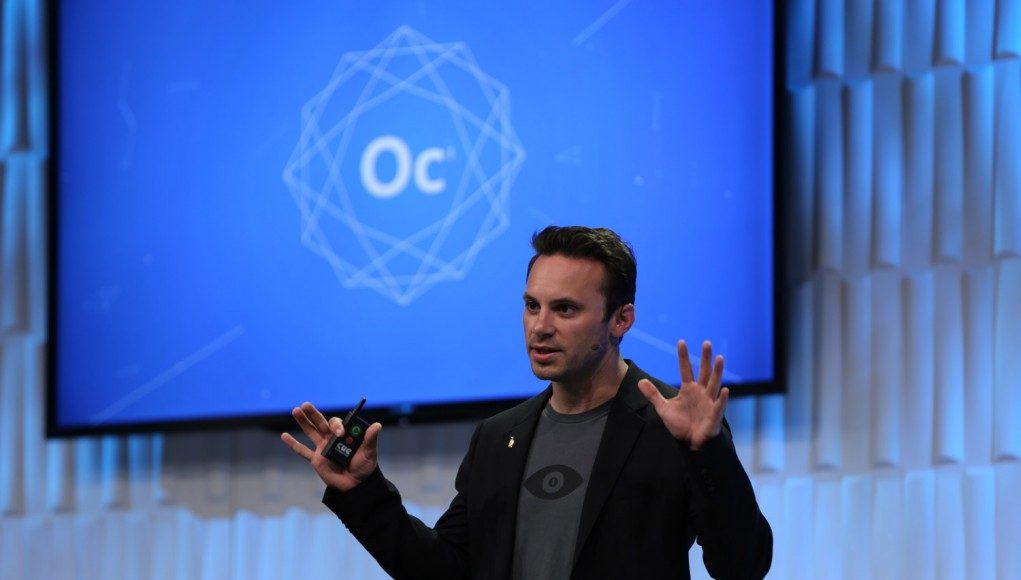Oculus co-founder Brendan Iribe is leaving Facebook. Citing “a source close to the matter,” a report from TechCrunch indicates his departure is related to the cancellation of a Rift 2 headset, though Facebook has denied that element of the report.

Brendan Iribe was among the founding members of Oculus, and held the role of CEO from the 2012 inception of the company, through the 2014 Facebook acquisition, until the end of 2016 when he stepped down to head the PC division of Oculus as Hugo Barra took over as head of Oculus.
Now Iribe says he’s departing Facebook entirely. On the surface, it looks like an amicable split, with Iribe saying on Facebook that he was proud of the work Oculus has done and thanking Facebook CEO Mark Zuckerberg for believing in the future of VR:
So much has happened since the day we founded Oculus in July 2012. I never could have imagined how much we would accomplish and how far we would come. And now, after six incredible years, I am moving on.
I’m deeply proud and grateful for all that we’ve done together. We assembled one of the greatest research and engineering teams in history, delivered the first step of true virtual presence with Oculus Rift and Touch, and inspired an entirely new industry. We started a revolution that will change the world in ways we can’t even envision.
Yet, as far as we’ve come, the journey has just begun. Michael Abrash is right: “These are the good old days”. Now is when we get to pioneer the foundation of the next great computing platform and medium – this is our time to be pushing the state-of-the-art onward and upward. Every part of VR and AR needs to improve, especially the hardware and core technology, and Oculus has the best team in the world to do that. Although we’re still far from delivering the magical smart glasses we all dream about, now they are nearly within our reach.
Working alongside so many talented people at Oculus and Facebook has been the most transformative experience of my career. We have a saying when someone compliments or thanks you – “Team effort”. The success of Oculus was only possible because of such an extraordinary team effort. I’d like to sincerely thank everyone that’s been a part of this amazing journey, especially Mark for believing in this team and the future of VR and AR.
As for me, this will be the first real break I’ve taken in over 20 years. It’s time to recharge, reflect and be creative. I’m excited for the next chapter.
Key executives from Facebook’s VR team thanked Iribe for his work, vision, and leadership.
But a report from TechCrunch, citing “a source close to the matter,” suggests that Iribe’s departure was directly related to the (unconfirmed) cancellation of the Rift 2.
Iribe is leaving Facebook following some internal shake-ups in the company’s virtual reality arm last week that saw the cancellation of the company’s next generation “Rift 2” PC-powered virtual reality headset, which he had been leading development of, a source close to the matter told TechCrunch.
Iribe and the Facebook executive team had “fundamentally different views on the future of Oculus that grew deeper over time,” and Iribe wasn’t interested in a “race to the bottom” in terms of performance, we are told.
We’ve gone about this afternoon trying to verify or debunk this information. Speaking to Road to VR, a spokesperson for Oculus denied the TechCrunch report:
[We are confirming that] we are planning a future version of Rift. You may remember Mark saying this at OC5: “… when we release the next version of Rift—which isn’t this year—all of the content that works for Rift will also work on the next version.”
So while we aren’t quite ready to talk about the next version of Rift, PC VR is still a category we are investing in. It’s still a part of our strategy – we’re continuing work across product and content and you’ll see this manifest next year. Additionally, Nate [Mitchell, another Oculus co-founder,] continues to lead the Rift/PC team and there are no changes there.
Andrew “Boz” Bosworth, the VP of AR and VR at Facebook, affirmed a similar denial to Variety on Twitter.
Though it stands to reason that if the Rift 2 has indeed been canceled, Facebook would not want to announce this information as it could have a major impact on existing Rift sales and software ecosystem, including developers whose livelihoods are dependent on its continued existence.
Nate Mitchell, another Oculus co-founder who is still with the company, said that they are “driving forward” with the Rift, but didn’t mention a “Rift 2” specifically:
A lot of questions today about the future of Rift — we’re still driving forward on the Rift/PC platform with new hardware, software, and content.
Lots of great stuff in the works. More to share in the months ahead.
Another source at Oculus also tells us that the TechCrunch report isn’t accurate.
Lucas Matney, the author of the TechCrunch piece, doubled down on the authenticity of his report, suggesting that the official denials are using vagary to obfuscate the underlying claim.
Plans to build a PC headset further down the line is a different clarification than them shelving plans for a productized "Rift 2" headset. There may be future PC headset with the Rift name, but the next-generation that was being planned has been cancelled. https://t.co/9MILJIoyc8
— Lucas Matney (@lucasmtny) October 22, 2018
– – — – –
With the Rift launched in 2016 and Oculus not so much as uttering the words “Rift 2” in the time since, rumblings began among Rift enthusiasts that Facebook’s priorities may have shifted away from PC VR. Back in March, Oculus confronted that notion directly, with the company’s Head of Content, Jason Rubin, affirming the continued importance of PC VR to the company.
“I want to be really really clear here: PC is vital to the VR business. We think PC will lead the industry for the next decade or more,” he said. “There’s so much more we’re going to be able to do with VR, and PC is where we figure that out. So Oculus is investing just as much in PC as ever. We’re in all three categories [PC, mobile, and standalone], and plan to stay there.”
Even still, he steered clear of “Rift 2.”

More recently, back in May, Oculus showed off a brand new prototype PC VR headset (the first since the Rift launched) called Half Dome, which showcased much of the company’s recent R&D work. Half Dome is the clearest picture yet of what a Rift 2 could look like, and the company put it right in the spotlight.
Even more recently, Mark Zuckerberg got up on stage at Oculus Connect last month and clearly stated that the company was focusing on three distinct product categories, PC VR among them.
The TechCrunch report, however, indicates that the cancellation of the Rift 2, which purportedly led to Iribe’s departure, happened just last week.







